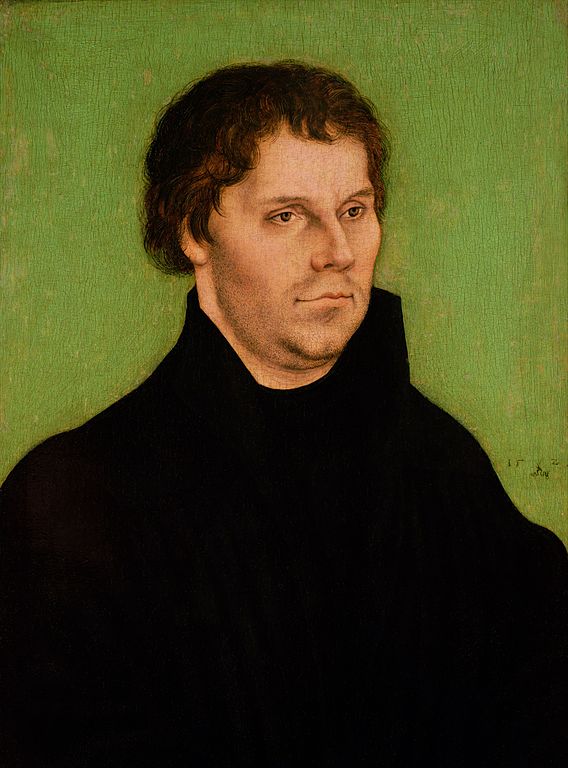+ Reformed Apologist James Swan’s Belittling Contempt of Luther

1) From: That Jesus Christ Was Born a Jew [1523] from Luther’s Works [“LW”]: Vol. 45, pp. 199, 205-206; translated by Walther I. Brandt:
A new lie about me is being circulated. I am supposed to have preached and written that Mary, the mother of God, was not a virgin either before or after the birth of Christ, but that she conceived Christ through Joseph, and had more children after that.
[ . . . ]
Now just take a look at the perverse lauders of the mother of God. If you ask them why they hold so strongly to the virginity of Mary, they truly could not say. These stupid idolators do nothing more than to glorify only the mother of God; they extol her for her virginity and practically make a false deity of her. But Scripture does not praise this virginity at all for the sake of the mother; neither was she saved on account of her virginity. Indeed, cursed be this and every other virginity if it exists for its own sake, and accomplishes nothing better than its own profit and praise.
The Spirit extols this virginity, however, because it was needful for the conceiving and bearing of this blessed fruit. Because of the corruption of our flesh, such blessed fruit could not come, except through a virgin. Thus this tender virginity existed in the service of others to the glory of God, not to its own glory. If it had been possible for him to have come from a [married] woman, he would not have selected a virgin for this, since virginity is contrary to the physical nature within us, was condemned of old in the law, and is extolled here solely because the flesh is tainted and its built-in physical nature cannot bestow her fruit except by means of an accursed act. Hence we see that St. Paul nowhere calls the mother of God a virgin, but only a woman, as he says in Galatians 3 [4:4], “The Son of God was born of a woman.” He did not mean to say she was not a virgin, but to extol her virginity to the highest with the praise that is proper to it, as much as to say: In this birth none but a woman was involved, no man participated; that is, everything connected with it was reserved to the woman, the conceiving, bearing, suckling, and nourishing of the child were functions no man can perform. It is therefore the child of a woman only; hence, she must certainly be a virgin. But a virgin may also be a man; a mother can be none other than a woman.
For this reason, too, Scripture does not quibble or speak about the virginity of Mary after the birth of Christ, a matter about which the hypocrites are greatly concerned, as if it were something of the utmost importance on which our whole salvation depended. Actually, we should be satisfied simply to hold that she remained a virgin after the birth of Christ because Scripture does not state or indicate that she later lost her virginity. We certainly need not be so terribly afraid that someone will demonstrate, out of his own head apart from Scripture, that she did not remain a virgin. But the Scripture stops with this, that she was a virgin before and at the birth of Christ; for up to this point God had need of her virginity in order to give us the promised blessed seed without sin.
***
2) From: Sermons on the Gospel of St. John [1537-1540]; chapter one; LW: Vol. 22, p. 23; translated by Martin H. Bertram:
The devil is doing his worst against this article of the divinity and the humanity of Christ, which he finds intolerable. Christ must be true God, in accord with the powerful testimony of Scripture and particularly of St. Paul, who declares that in Him the whole fullness of the Deity dwells bodily (Col. 2:9); otherwise we are damned forever. But in His humanity He must also be a true and natural son of the Virgin Mary, from whom He inherited flesh and blood as any other child does from its mother. He was conceived of the Holy Spirit, who came upon her and overshadowed her with the power of the Most High, according to Luke 1:35. However, Mary, the pure virgin, had to contribute of her seed and of the natural blood that coursed from her heart. From her He derived everything, except sin, that a child naturally and normally receives from its mother. This we must believe if we are not to be lost. If, as the Manichaeans allege, He is not a real and natural man, born of Mary, then He is not of our flesh and blood. Then He has nothing in common with us; then we can derive no comfort from Him. However, we do not let ourselves be troubled by the blasphemies which the devil, through the mouths of his lying servants, speaks against Christ the Lord—now against His divinity, now against His humanity—and by the attacks which he then makes against Christ’s office and work. But we cling to the Scriptures of the prophets and apostles, who spoke as they were moved by the Holy Spirit (2 Peter 1:21). Their testimony about Christ is clear. He is our Brother; we are members of His body, flesh and bone of His flesh and bone. According to His humanity, He, Christ, our Savior, was the real and natural fruit of Mary’s virginal womb (of which Elizabeth, filled with the Holy Spirit, said to her in Luke 1:42: “Blessed is the fruit of your womb!”). This was without the co-operation of a man, and she remained a virgin after that. Everything else that a mother imparts to a child was imparted by Mary, the mother of God’s eternal Son. Even the milk He sucked had no other source than the breasts of this holy and pure mother.
***
3) From: Sermons on the Gospel of St. John [1537-1540]; chapter two; LW: Vol. 22, p. 214; translated by Martin H. Bertram:
Now the question may occupy us how Christ could have brothers, since He was the only Son of Mary, and the Virgin Mary bore no children besides Him. Some say that Joseph had been married before his marriage to Mary, and that the children of this first wife were later called Christ’s brothers. Others say that Joseph had another wife simultaneously with Mary, for it was permissible for the Jews to have two wives. In the Book of Ruth we hear that a poor daughter was often left on the shelf (Ruth 3:10 ff.). This displeased God; therefore He commanded that such daughters be provided for. Thus it became incumbent upon the nearest relative or friend to marry such a poor orphan girl. Mary, too, was a poor little orphan, whom Joseph was obligated to marry. She was so poor that no one else wanted her. Any children born to Joseph by other wives would have been half brothers of Christ. This is the explanation offered by some. But I am inclined to agree with those who declare that “brothers” really means “cousins” here, for Holy Writ and the Jews always call cousins brothers. Be that as it may, it matters little. It neither adds to nor detracts from faith. It is immaterial whether these men were Christ’s cousins or His brothers begotten by Joseph. In any event, they moved to Capernaum with Christ, where they took charge of the parish. We may infer from this text that they were a poor little group. After Joseph’s death they probably found it impossible to support themselves in Nazareth and for this reason left and moved to Capernaum. But just how and why this happened is a moot question. Christ was born in Bethlehem and reared in Nazareth, and now He is residing as a pastor in Capernaum. This town is His parish. He chose it as the place where He was to reside as bishop and as burgher, just as our pastor dwells here and is our bishop. Christ did not remain in Capernaum permanently. No, He wandered about. He returned to Nazareth and journeyed through all of Galilee, preaching and performing miracles; and then He would return to His abode in Capernaum. The other prophets did the same. Samuel lived in Ramah, and from there he “went on a circuit” to preach in the adjacent countryside (1 Sam. 7:16–17).
***
The evidence is so compelling that even James Swan, the virulently anti-Catholic Reformed Protestant polemicist, who writes a lot about Luther, freely admitted in a post dated 9-21-14 on his website, Boors All:
It’s certainly true that Luther believed in Mary’s perpetual virginity, and there’s no need to be embarrassed by such an historical fact. Luther never appears to waver on Mary’s perpetual virginity.
But Swan acknowledges Luther’s belief here, in effect, while plugging his nose and grimacing. He wrote in a comment, dated 1-19-07:
[T]he specific Marian doctrines put forth by Rome tend to deify Mary. Thus, I see the extra-biblical doctrines attributed to Mary as nothing other than a violation of the commandment against idolatry. The Scriptures are clear on Mary’s lack of perpetual virginity (Matthew 1:18-25).
That being said, I think the Reformers, (Luther and Zwingli) would be an example of people who held to this Marian doctrine and had “an evangelical understanding of the Gospel.” But, I think the reason they did hold this belief was the result of a well entrenched tradition, rather than exegesis of the Biblical text. Each generation comes with its own set of non-biblical traditions.
I can cut these guys some slack- because I realize that the paradigm change that Luther and Zwingli went through didn’t mean that all of sudden they were evangelicals with little fish pins on their jackets, and bumper stickers on their horses. Rooting out unbiblical traditions takes time.
On the other hand, I don’t cut any modern day evangelicals holding to this belief any slack. The Biblical exegetical material on who Mary was is vast. If a modern-day evangelical attempts to hold this view, they are clearly in error, and should be exhorted according to the clear teachings of Scripture.
This is standard, stock, garden-variety anti-Catholic polemics. Whatever the “reformers” retained of Catholic belief, they obviously did, not because these things were true, but because it was a holdover from the long tradition, and since they were transitional figures, they couldn’t fully get it out of their system.
Ironically, this is far more insulting to Luther and Calvin than what I would say (or have ever said) about them, because it belittles their understanding and almost mocks them. Luther was so stupid and uninformed, according to Swan, that he couldn’t even figure out that the perpetual virginity of Mary “tend[s] to deify Mary” and is an instance of rank “idolatry.” Luther may have been many things, but he was not stupid; nor biblically illiterate. He knew more about Scripture in his little finger than Swan (who rarely ever attempts biblical exegesis at all) could ever dream of knowing.
Yet Swan’s fertile, illustrious brain comes up with the ludicrous notion that Luther was a great exegete when it came to justification and other Protestant distinctives, but when it came to Mary, he apparently did no exegesis at all, and somehow missed the “clear” biblical teaching and was the slave of “non-biblical tradition.”
Thus, Martin Luther: the great proponent and virtual inventor of sola Scriptura and the perspicuity (clearness) of Scripture; the guy who said that even a plowboy could figure out that the Bible teaches Protestantism, falls completely flat when it came to Mary, and couldn’t grasp the “clear” teaching of Scripture. How ironic, huh?
But we can rest easy at night knowing that James Swan, in his gracious and compassionate mercy, is willing to give Luther a pass in this regard. He was blind because he had once been a Catholic.
In so doing, he treats Martin Luther with far more disrespect than I ever have: as a simpleton and a dumbbell, beholden to the worst sort of idolatry. John Calvin mocked Luther as a “half-papist” too, because Luther dared to still believe in the Real Presence in the Eucharist (in a way similar, but not identical to the Catholic view).
So if Calvin thought Luther was an absolute idiot with regard to the Eucharist, it should surprise us not at all that his follower James Swan thinks Luther was an absolute ignoramus, imbecile, and idiot when it came to Marian doctrines that most Protestants now reject as “self-evidently unbiblical.”
***
(9-23-14)
Photo credit: Portrait of Martin Luther (1525), by Lucas Cranach the Elder (1472-1553) [public domain / Wikimedia Commons]
***













